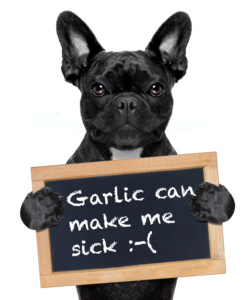Buddy, a very sweet Labrador Retriever, came to us for examination and vaccines. During the exam, when I went to look in his ears, he screamed and pulled away. Very gently I raised his floppy ear to find a severe ear infection. His ear was red, swollen, and had a large amount of yellow debris. Every time we reached for his head he would pull away and you could see the sadness in his eyes. We discussed with his owner that Buddy had a painful ear infection and that we wanted to treat him for it. Her response: “I can’t get medications at this time, but I give him garlic so that will take care of it”.
Hannah, a young Spaniel mix, came in for spay and vaccines. During her examination, we found that she was missing hair around her back and tail base and was covered in fleas. We called the owner to explain how Hannah had so many fleas and how they were causing hair loss and discomfort. We asked if we could apply a dose of a veterinary-approved flea treatment. She said: “No thanks, I don’t want to give my dog toxic chemicals. I use garlic for fleas”.
Why do so many people believe that Garlic is an acceptable way to treat health issues in pets? According to the National Institute of Health (https://nccih.nih.gov/health/garlic/ataglance.htm) garlic is believed to help people with lowering cholesterol, blood pressure, and preventing some forms of cancer. Although these benefits have not been backed by strong scientific research, there are reports that demonstrate that garlic is likely to provide some health benefits. Overall, garlic is safe for most people with some few potential problems, primarily in people with bleeding disorders.

We need to remember that although we love our pets like our own children, they are not little people. Medications and foods that are safe for us can result in serious and even deadly conditions in our pets. Garlic is believed to decrease an animal’s flea infestation by changing the taste and smell of their skin, thus acting as a repellent. Small quantities of garlic, like those found in dog foods, are not toxic. But garlic, like onions, can cause gastrointestinal irritation (vomiting, diarrhea, decreased or lack of appetite) and lead to a serious condition called Heinz Body Anemia, in which red blood cells and hemoglobin are destroyed. Signs of Heinz body anemia include weakness, respiratory difficulties, and in severe cases death. Cats can get sick with smaller doses of Garlic than dogs. Also, because Garlic doesn’t actually kill the fleas, the fleas that do bite the pet are still able to transmit diseases and cause flea allergies.

Because Garlic does not actually kill fleas, it helps promote infestation. Indoor pets that suffer from fleas who are not given a product that kills fleas, can cause a severe infestation of the home which can take as long as 6 months to eliminate with aggressive home treatments and veterinary-approved pet flea products. Fleas are not just a pest to our pets. People can suffer from flea bites in homes with large loads of fleas. An average flea lays 50 eggs per day and these eggs can take months to hatch, making monthly, year-around flea prevention important in controlling and preventing flea infestations. Why prevent? By the time you see fleas on your pet, you are likely to have a flea infestation in your home.

So, before you say that you do not want to apply a toxic product to your pet, consider the toxic effects of the natural remedy you are considering. Just because something is labeled ‘natural’ doesn’t mean that they cannot cause problems. Many herbs, vegetables, fruits, and mushrooms that are found in nature can be deadly to our beloved pets. Always consult your veterinarian before you try a home remedy. It could save you money and heartache in the long run.
To view all posts in Rascal’s Corner click here!

